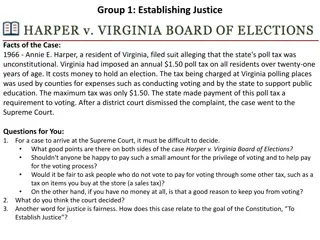Freeman Team Progress Update
Building upon our last meeting with the Freeman Team, we have made significant strides in forming a cohesive and diverse crew, exploring new ideas in the center and satellite projects, gathering patient input, analyzing data, and devising ways to streamline processes for improved efficiency and effectiveness.
Uploaded on Feb 25, 2025 | 0 Views
Download Presentation

Please find below an Image/Link to download the presentation.
The content on the website is provided AS IS for your information and personal use only. It may not be sold, licensed, or shared on other websites without obtaining consent from the author.If you encounter any issues during the download, it is possible that the publisher has removed the file from their server.
You are allowed to download the files provided on this website for personal or commercial use, subject to the condition that they are used lawfully. All files are the property of their respective owners.
The content on the website is provided AS IS for your information and personal use only. It may not be sold, licensed, or shared on other websites without obtaining consent from the author.
E N D
Presentation Transcript
One algorithm from The Book: A tribute to Ira Pohl Alexander Stepanov A9.com http://www.stepanovpapers.com/IraPohlFest.pdf 1
The highest compliment [Erds] could pay to a colleague's work was to say, That's straight from The Book. Encyclopedia Britannica 2
CS needs its Book The Book contains algorithms that are: Beautiful Optimal Useful 3
Finding both min and max To find minimum (or maximum) of n elements we need n 1 comparisons Don t we need 2n 2 (or 3?)comparisons to find both? Ira showed that we need at most comparisons And he showed that his algorithm is optimal 5
maybe min or maybe max not max not min not min and not max 6
Strict Weak Ordering Weak trichotomy Transitivity Irreflexivity, or strictness 7
template <StrictWeakOrdering R> struct min_max { R r; template <Regular T> // T == Domain<R> const T& min(const T& x, const T& y) const { if (r(y, x)) return y; else return x; } 8
Weak Commutativity Is min commutative? Not for StrictWeakOrdering Weak Commutativity! Set with min defined is semigroup (weak Abelian) semigroup Weak theories equivalence axioms (instead of equational) 9
template <Regular T> // T == Domain<R> const T& max(const T& x, const T& y) const { if (r(y, x)) return x; else return y; } 10
// the idiot who designed STL wrote: template <Regular T> // T == Domain<R> const T& max(const T& x, const T& y) const { if (r(x, y)) return y; else return x; } // why is it wrong? 11
template <Regular T> // T == Domain<R> pair<T, T> construct(const T& x, const T& y) const { if (r(y, x)) return {y, x}; elsereturn {x, y}; } 12
template <Regular T> // T == Domain<R> pair<T, T> combine(const pair<T, T>& x, const pair<T, T>& y) const { return { min(x.first, y.first), max(x.second, y.second) }; } }; 13
Iterators Input Forward Bidirectional RandomAccess 14
template <StrictWeakOrdering R> struct compare_dereference { R r; template <InputIterator I> // Domain<R> == ValueType<I> booloperator()(const I& i, const I& j) const { return r(*i, *j); } }; 15
template <ForwardIterator I, StrictWeakOrdering R> pair<I, I> min_max_element_even_length(I first, I last, R r) { // assert(distance(first, last) % 2 == 0) min_max<compare_dereference<R>> op{r}; if (first == last) return {last, last}; 16
I prev = first; pair<I, I> result = op.construct(prev, ++first); while (++first != last) { prev = first; result = op.combine( result, op.construct(prev, ++first)); } return result; } 17
template <ForwardIterator I, StrictWeakOrdering R> pair<I, I> min_max_element(I first, I last, R r) { min_max<compare_dereference<R>> op{r}; I prev = first; if (first == last || ++first == last) return {prev, prev}; 18
pair<I, I> result = op.construct(prev, first); while (++first != last) { prev = first; if (++first == last) return op.combine(result, {prev, prev}); result = op.combine( result, op.construct(prev, first)); } return result; } 19
Type Functions template <InputIterator I> using ValueType = typename std::iterator_traits<I>::value_type; 20
template <InputIterator I, StrictWeakOrdering R> pair<ValueType<I>, ValueType<I>> min_max_value_nonempty(I first, I last, R r) { typedef ValueType<I> T; min_max<R> op{r}; T val = *first; if (++first == last) return {val, val}; 21
pair<T, T> result = op.construct(val, *first); while (++first != last) { val = *first; if (++first == last) return op.combine(result, {val, val}); result = op.combine( result, op.construct(val, *first)); } return result; } 22
template <InputIterator I, StrictWeakOrdering R> pair<ValueType<I>, ValueType<I>> min_max_value(I first, I last, R r) { typedef ValueType<I> T; if (first == last) return {supremum(r), infimum(r)} return min_max_value_nonempty(first, last, r); } 23
I have been teaching this algorithm every 2 3 years for the last 30 years When I teach it, I implement it anew Writing the code and teaching it gives me joy every time 24
Getting rid of an extra compare // Add to min_max: template <Regular T> // T == Domain<R> pair<T, T> combine(const pair<T, T>& x, const T& val) const { if (r(val, x.first)) return { val, x.second}; if (r(val, x.second)) return x; return {x.first, val}; } 26
Getting rid of an extra compare (2) // In min_max_element and // min_max_value_nonempty, replace: if (++first == last) return op.combine(result, {val, val}); // with if (++first == last) return op.combine(result, val); 27























